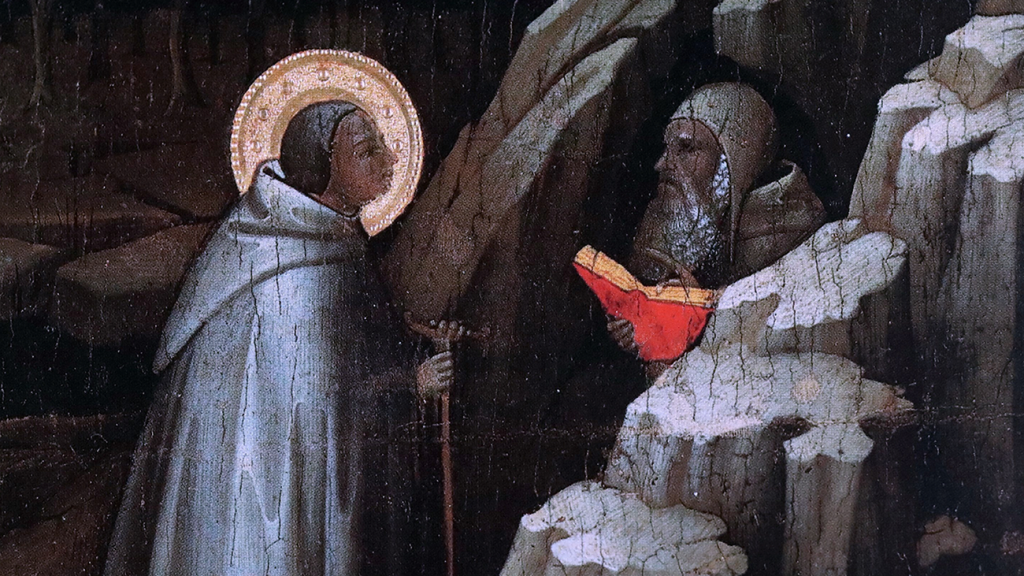Today is the feast of St Paul the Hermit (above right), who died in the 340s. Paul is a contender for the position of first-ever Christian hermit, with the honorary title of ‘first-born of all the desert monks’. He was an accidental hermit, as he originally fled from the threat of Roman persecution to hide out in a desert cave in southern Egypt – but after a while decided to stay there for the rest of his long life. After 90 years with no visitors, he was discovered by St Anthony, who later paid him a second visit only to find he had died. According to legend, when Anthony buried him, two lions acted as the gravediggers.
‘They came straight to the corpse of the blessed old man and there stopped, fawned upon it and lay down at its feet, roaring aloud as if to make it known that they were mourning in the only way possible to them. Then they began to paw the ground close by, and vie with one another in excavating the sand, until they dug out a place just large enough to hold a man.’ St Jerome, Life of Paul the First Hermit
Tonight in 1941 saw the world premiere of the French composer Olivier Messiaen’s piece, Quartet for the End of Time – in Hut 27 of the German prisoner of war camp, Stalag VIII-A, in Poland. Messiaen, who had been captured by the Germans a few months earlier, composed the quartet using pencil and paper supplied by a sympathetic guard, and wrote for the few instruments available – a battered upright piano, a cello with three strings, a violin and clarinet. The music was inspired by an angel which appears in the Book of Revelation, clothed with a cloud, and wearing a rainbow, who stands on the sea and announces the end of time. Several hundred prisoners crowded to hear the performance, and Messiaen said, ‘Never before have I been listened to with such attention and understanding.’
Martin Luther King, the Baptist minister and American civil rights leader, was born in Atlanta, Georgia, today in 1929, and was named Michael. His name was changed in 1934, when his father, Rev. Mike King, made a life-changing visit to Europe, where he visited historic sites in Germany connected with Martin Luther, the founder of the Protestant faith. After King arrived home, he changed his own name to Martin Luther King, and for consistency renamed five year-old Mike King Jr as Martin Luther King Jr. Young Martin was reluctant to own the great reformer’s name, only saying in 1955 that perhaps he had earned it when his home was bombed and he was jailed during the Montgomery Bus Boycott.
‘Of course I was religious. I grew up in the church. My father is a preacher, my grandfather was a preacher, my great-grandfather was a preacher, my only brother is a preacher, my daddy’s brother is a preacher. So I didn’t have much choice.’ Martin Luther King, Autobiography
Francis Ferdinand de Capillas, the Spanish missionary who is regarded as the first martyr of China, was executed in the city of Fu’an today in 1648. He entered the country under the Ming dynasty, which was tolerant of missionaries, but when forces of the Qing dynasty (which was hostile) invaded, De Capillas was captured, tortured, and beheaded. Today is his feast day.
Today in 1672, John Cosin, an English high church royalist, died in Westminster. He was a chaplain, archdeacon and eventually bishop in the time of Kings Charles I and II, and spent the years after the execution of Charles I in exile in Paris while Cromwell and the Puritans were ruling England. He is best known for writing 18 lines of verse, an English translation of the Latin hymn, Veni Creator Spiritus (‘Come Holy Ghost’), which was sung at the coronation of Charles I. His hymn has been used at every English and British coronation since then, and was included in the Book of Common Prayer in 1662.
Come Holy Ghost; our souls inspire
And lighten with celestial fire.
Thou the anointing Spirit art,
Who dost thy seven-fold gifts impart.
Veni Creator Spiritus, translated by John Cosin
Image: jean louis mazieres
